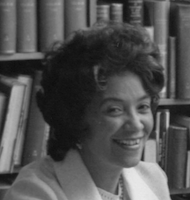Ella Gaines Yates facts for kids
Quick facts for kids
Ella Gaines Yates
|
|
|---|---|
 |
|
| President of the Freedom to Read Foundation | |
| In office 1985–1986 |
|
| Personal details | |
| Born | June 14, 1927 Atlanta, Georgia, U.S. |
| Died | June 27, 2006 (aged 79) |
| Nationality | American |
| Alma mater | Clark Atlanta University |
| Occupation | Librarian |
Ella Gaines Yates (June 14, 1927 – June 27, 2006) was a very important person in the world of libraries. She is famous for being the first African-American director of the Atlanta-Fulton Public Library System in Georgia. Her work helped make libraries better for everyone.
Contents
Early Life and Education
Ella Gaines Yates was born in Atlanta, Georgia, in 1927. Her family was well-known in the city. She went to Booker T. Washington High School. After high school, she was accepted into Spelman College, a famous college for women.
She graduated from Spelman College in 1949 with a bachelor's degree. Later, she earned her Master of Library Science (MLS) degree from Atlanta University in 1951. This degree helped her become a leader in the field of librarianship.
A Career in Libraries
Ella Gaines Yates had a long and impressive career working in libraries. She started as an assistant librarian at the Brooklyn Public Library in New York. She worked there from 1951 to 1955.
After that, she moved to New Jersey. She became the head of the children's department at the Orange Public Library. She also worked as a branch librarian at the East Orange Public Library. Later, she became an assistant director at the Montclair Public Library from 1970 to 1972.
Leading the Atlanta-Fulton Library
In 1976, Ella Gaines Yates became the director of the Atlanta-Fulton Public Library System. This was a huge step, as she was the first African-American person to lead such a major city library system. She faced many challenges but worked hard to make the library better.
Under her leadership, a brand new main library was built in downtown Atlanta. This modern building opened in May 1980. It was a big achievement for her and the city. She was the first African-American librarian in the country to have a major city library built while she was in charge.
To make sure the city got a fair deal on the library construction, she even earned a law degree! She studied at Atlanta Law School and graduated in 1979. This helped her understand important contracts and agreements.
Expanding Library Services
Ella Gaines Yates believed that libraries should be for everyone. She worked to expand library services for many different groups of people.
- She made sure the library offered more help for people with disabilities.
- She created programs for different ethnic groups.
- She even brought library services to prisoners. The Fulton County Jail became the first prison in the country to have its own public library branch.
Her goal was to make sure everyone in the community could use and benefit from the library.
Other Important Work
Ella Gaines Yates was involved in many important groups. She was a member of the American Library Association (ALA). She was also part of the Black Caucus of ALA, which supports African-American librarians.
She was a member of the NAACP, a civil rights organization. She helped create the Coretta Scott King Award, which celebrates amazing books by African-American authors and illustrators.
She also wrote an article about "Sexism in the Library Profession." She worked as a research writer for the U.S. Civil Rights Commission. She was also a member of the Delta Sigma Theta sorority.
Later in her career, she started her own company called Yates Library Consultants. She also taught at the University of Washington’s Graduate Library School. She even served as the State Librarian of the Virginia State Library for a time.
Later Years
Ella Gaines Yates returned to Atlanta later in her life. She briefly served as the interim director of the Atlanta-Fulton Public Library again in 1998. She continued to work for libraries and help communities.
Ella Gaines Yates passed away on June 27, 2006, at the age of 79. She left behind a legacy of making libraries more accessible and inclusive for everyone.
 | May Edward Chinn |
 | Rebecca Cole |
 | Alexa Canady |
 | Dorothy Lavinia Brown |

